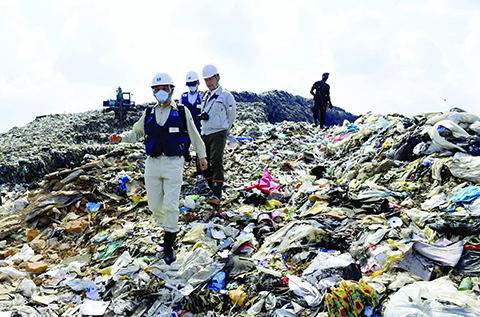 Japanese officials with a disaster relief team survey the site of a garbage dump collapse that killed 32 people on the northeastern edge of Sri Lankaís capital Colombo on April 21, 2017. A Japanese disaster relief team is advising the Sri Lankan government on measures to deal with the huge rubbish dump and relocate hundreds of families in the neighbourhood following the April 14 disaster. / AFP / Ishara S. KODIKARA
Japanese officials with a disaster relief team survey the site of a garbage dump collapse that killed 32 people on the northeastern edge of Sri Lankaís capital Colombo on April 21, 2017. A Japanese disaster relief team is advising the Sri Lankan government on measures to deal with the huge rubbish dump and relocate hundreds of families in the neighbourhood following the April 14 disaster. / AFP / Ishara S. KODIKARACOLOMBO: Sri Lanka has outlawed protests over Colombo's garbage crisis following rallies over the city's waste disposal after a landslide at a giant rubbish tip killed 32 people and destroyed 145 homes. President Maithripala Sirisena announced that anyone preventing city authorities from disposing of garbage could be prosecuted and face an indefinite period in jail, his office said yesterday.
"Any person who by word or deed causes a disruption of garbage disposal will be guilty of an offence," the presidential order stated. Armed with new powers, garbage collectors yesterday began clearing the trash that has been piling up on Colombo's streets for a week since the city's main tip-a 300-foot rubbish mountain-collapsed on homes.
Authorities were forced to dispose of garbage at alternative locations but that had triggered angry protests by residents who blocked trucks from dumping rubbish. Sri Lanka has ended a grim search for survivors after the landslide, and was now clearing the site at Kolonnawa outside the capital.
A team of Japanese experts who flew in this week to advise Colombo on how to deal with the aftermath were seen surveying at the site yesterday. "We hope to be able to give a report by Tuesday," said Mitsutake Numahata, a Japanese official heading the delegation, "We are looking at what to do with the dump itself and the threat to neighboring areas." Local authorities have already declared areas around the vast tip unsafe for housing.
Prime Minister Ranil Wickremesinghe promised survivors that permanent housing would be provided within a couple of months, and pledged to shift the dump elsewhere. Parliament had earlier been warned that the towering mountain of trash posed a serious health hazard and that a long-term solution was needed to dispose of Colombo's waste. A night of heavy rain, followed by an outbreak of fire, destabilized the 23 million-ton garbage heap at Kolonnawa, causing its collapse. - AFP










